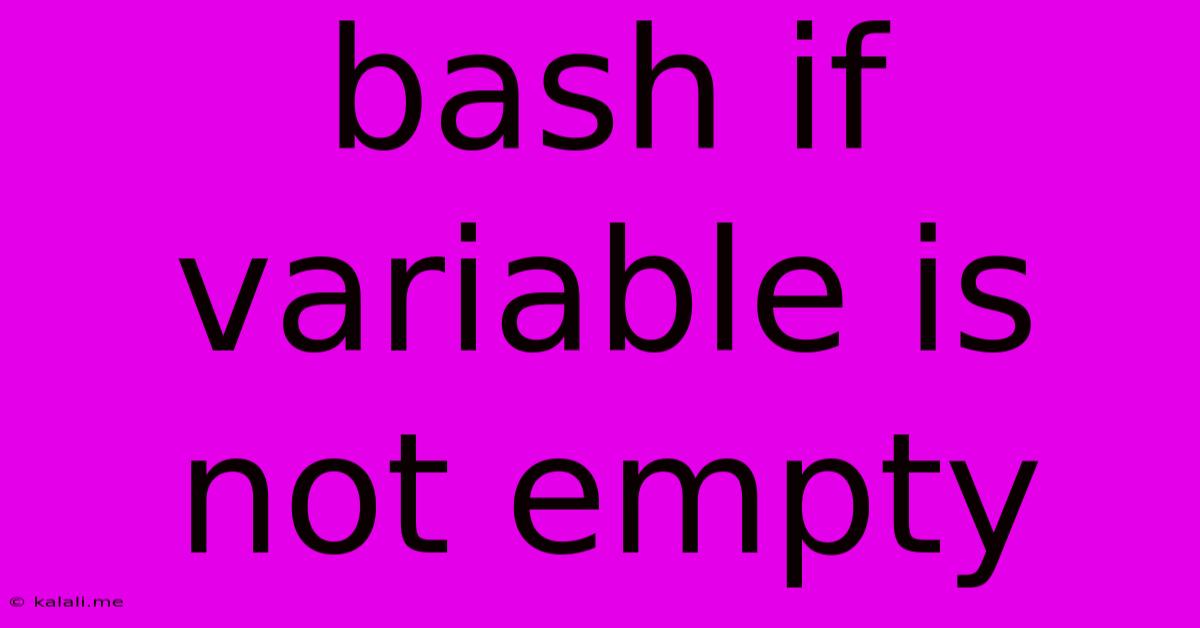Bash If Variable Is Not Empty
Kalali
Jun 03, 2025 · 3 min read

Table of Contents
Bash If Variable is Not Empty: A Comprehensive Guide
This article provides a comprehensive guide on how to check if a variable is not empty in Bash scripting. Knowing how to effectively handle empty and non-empty variables is crucial for writing robust and reliable Bash scripts. We'll explore various methods, their nuances, and best practices.
In Bash, an empty variable is considered false, while a non-empty variable is considered true. This simplifies conditional checks. However, understanding the different ways to perform these checks and the situations where one method is preferable over another is key to efficient scripting.
Method 1: Using -z
The -z operator is the most straightforward and commonly used method to check for an empty string. It returns true if the string is null (empty), and false otherwise. Therefore, to check if a variable is not empty, we use the negation operator !:
my_variable="Hello, world!"
if [ ! -z "$my_variable" ]; then
echo "The variable is not empty."
else
echo "The variable is empty."
fi
Explanation:
-
[ ! -z "$my_variable" ]: This is the core of the conditional statement.[is an alias for thetestcommand.-zchecks if the length of the string is zero.!negates the result. The quotes around"$my_variable"are crucial to prevent word splitting and globbing issues, especially if the variable might contain spaces. -
then ... else ... fi: This is the standard Bashif-elsestructure.
This method is concise and highly readable, making it a preferred choice for most scenarios.
Method 2: Using -n
The -n operator is the opposite of -z. It returns true if the string is not empty, and false otherwise. This allows for a slightly more direct check:
my_variable="Hello, world!"
if [ -n "$my_variable" ]; then
echo "The variable is not empty."
else
echo "The variable is empty."
fi
This achieves the same result as Method 1 but with a slightly different syntax. The choice between -z and -n often comes down to personal preference and coding style.
Method 3: Using [[ ]] (Double Square Brackets)
Bash also offers double square brackets [[ ]], which provide enhanced features and more robust parsing. This method is functionally equivalent to the previous ones:
my_variable="Hello, world!"
if [[ -n "$my_variable" ]]; then
echo "The variable is not empty."
else
echo "The variable is empty."
fi
or using -z:
my_variable="Hello, world!"
if [[ ! -z "$my_variable" ]]; then
echo "The variable is not empty."
else
echo "The variable is empty."
fi
While functionally similar to single brackets, double brackets offer better handling of word splitting and globbing, making them generally safer. It's recommended for most situations.
Method 4: Direct Comparison
You can also directly compare the variable to an empty string:
my_variable="Hello, world!"
if [[ "$my_variable" != "" ]]; then
echo "The variable is not empty."
else
echo "The variable is empty."
fi
This method is perfectly valid and readable. It explicitly checks if the variable is not equal to an empty string.
Best Practices
-
Always quote your variables: Using double quotes (
"$my_variable") prevents word splitting and globbing, which can lead to unexpected behavior, especially if your variable contains spaces or special characters. -
Choose a consistent method: Select one of the methods above and stick to it for consistency in your scripts.
-
Consider readability: While all methods achieve the same outcome, some are more readable than others. Prioritize clarity and maintainability.
By understanding these different approaches and adhering to best practices, you can write efficient, reliable, and easy-to-understand Bash scripts that correctly handle empty and non-empty variables. Remember to choose the method that best suits your coding style and project requirements.
Latest Posts
Latest Posts
-
Without God I Could Do Nothing
Jun 04, 2025
-
Dockerfile Set Arg To Bash Script
Jun 04, 2025
-
Red White Black Wires Light Switch
Jun 04, 2025
-
Temperature Measure Of Average Molecular Translational Kinestic Energty
Jun 04, 2025
-
Is Current The Same Throughout Series Circuit
Jun 04, 2025
Related Post
Thank you for visiting our website which covers about Bash If Variable Is Not Empty . We hope the information provided has been useful to you. Feel free to contact us if you have any questions or need further assistance. See you next time and don't miss to bookmark.